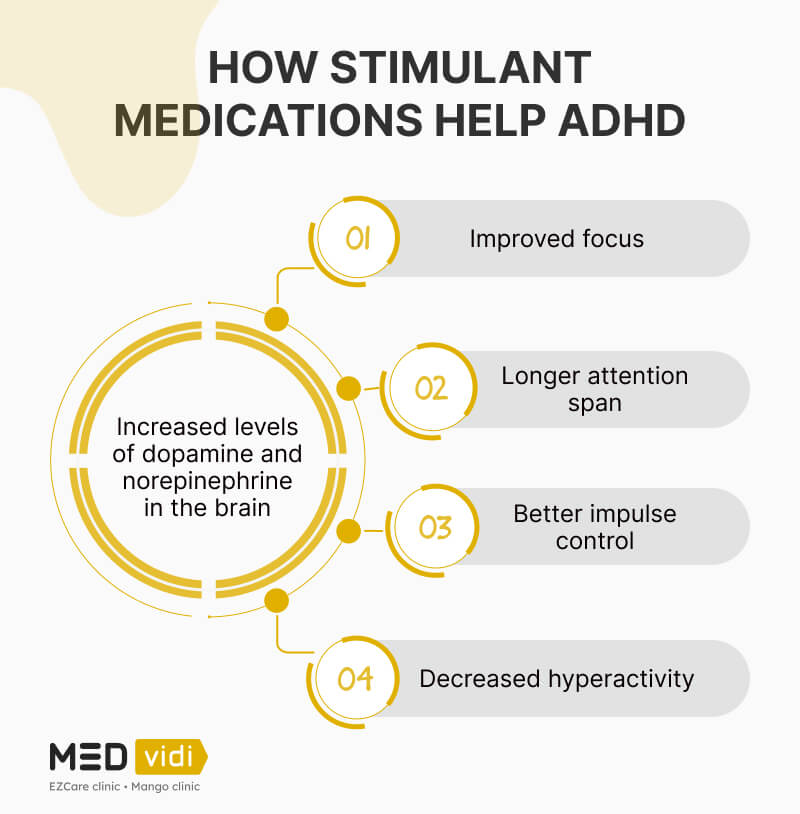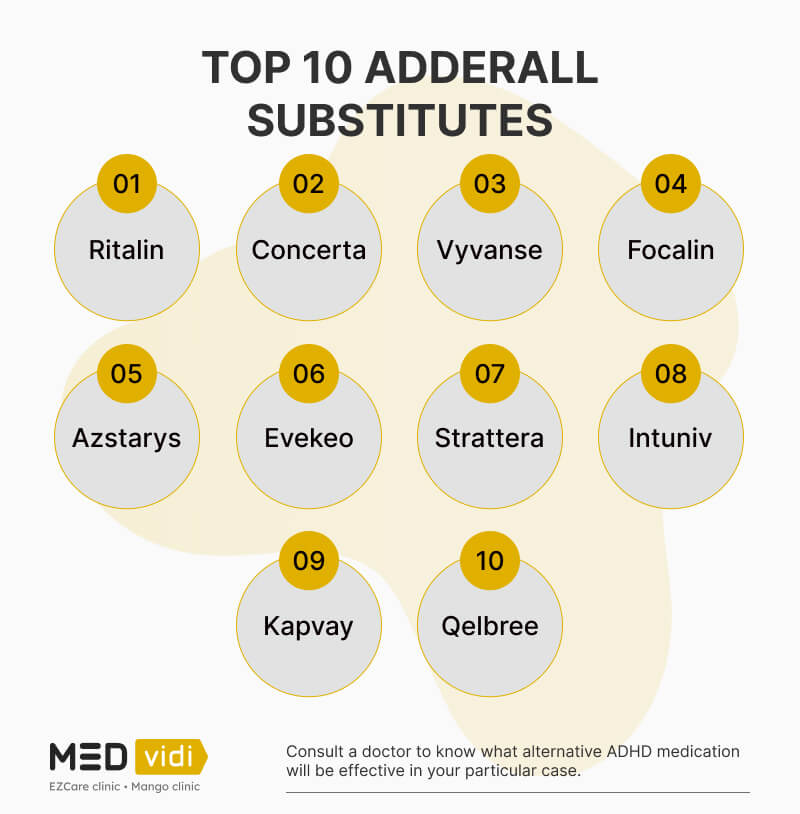Enhanced focus, efficiency, and cognitive growth are a necessity in today’s world. But improving these qualities can be challenging for individuals with attention deficit hyperactivity disorder (ADHD) or other conditions characterized by poor concentration and impulse control. To help individuals manage their symptoms and become more organized, doctors commonly prescribe stimulant medications like Adderall.
Adderall has been beneficial for many people with ADHD, due to its ability to stimulate the underdeveloped area of the prefrontal cortex. In this article, we will investigate a range of substitutes for Adderall, shedding light on available options that offer comparable advantages with fewer side effects.
See a qualified healthcare professional today. Your well-being and quality of life are worth investing in.
How Does Adderall Work?
Adderall is a central nervous system stimulant that contains a combination of amphetamine salts. It modulates the activity of three key neurotransmitters: dopamine, norepinephrine, and, to a lesser extent, serotonin. These chemicals play crucial roles in regulating attention, focus, and impulse control. By influencing the levels of these neurotransmitters in the brain, Adderall helps restore the balance of chemicals in individuals with ADHD. Let’s take a look at the mechanism of action in more detail.
- Dopamine. This neurotransmitter is associated with motivation, reward, and pleasure. Adderall increases the release of dopamine and, consequently, boosts its levels in specific brain regions. It results in enhanced cognitive functions related to attention and concentration.
- Norepinephrine. It helps regulate attention, arousal, and alertness. Adderall increases the release of norepinephrine, leading to heightened focus and wakefulness.
- Serotonin. While not as prominently influenced as dopamine and norepinephrine, serotonin is also affected by Adderall. It is involved in mood regulation, impulse control, and emotional stability. By modulating serotonin activity, Adderall may help individuals with ADHD improve their emotional resilience and impulse management.
The combined impact of increased dopamine and norepinephrine levels promotes attention span and inhibition of impulsive behavior. This enables individuals with ADHD to focus more effectively, prioritize tasks, and resist distractions.
Adderall also increases heart rate and blood pressure, which can contribute to the feeling of wakefulness and alertness. These physical effects may help individuals stay attentive and engaged during tasks that require sustained mental effort.
What Are the Best Alternatives to Adderall for ADHD? Top 10 Meds
While many patients are prescribed Adderall for ADHD, it is not suitable for everyone. Like with any medication, there are potential side effects, one of which includes Adderall tongue. Fortunately, there are alternative medications that offer similar benefits in addressing ADHD symptoms. Below, we’ll review stimulant and non-stimulant prescription medications as well as off-label options.
Stimulant Medications
Like Adderall, other potent stimulant medications also have great efficacy in managing ADHD symptoms. The most common ones include Ritalin, Vyvanse, and Concerta. Let’s review them in detail.
Ritalin (Methylphenidate)
Ritalin is a central nervous system stimulant that affects the levels of dopamine and norepinephrine in the brain. It is available in various formulations, including immediate-release and extended-release capsules, allowing for tailored treatment options based on individual needs.
Vyvanse (Lisdexamfetamine Dimesylate)
Vyvanse is a unique stimulant as it is an amphetamine prodrug. Once ingested, Vyvanse is converted into dextroamphetamine and released slowly into the bloodstream. This allows for an extended duration of action and lowers the risk of experiencing potential side effects. It is the drug of choice for those with an addiction history.
Concerta (Methylphenidate)
Concerta is another methylphenidate-based psychostimulant that effectively treats ADHD. Concerta is only formulated as an extended-release tablet, ensuring a gradual and sustained release of the medication.
Focalin (Dexmethylphenidate)
Focalin, also known by its generic name dexmethylphenidate, is a medication commonly prescribed for ADHD. It is a central nervous system stimulant and is chemically similar to methylphenidate, the active compound in Ritalin.
Dexedrine (Dextroamphetamine Sulfate)
Dexedrine is a prescription medication primarily used in the treatment of ADHD and narcolepsy. Dexedrine increases the levels of dopamine and norepinephrine in the brain. It is available in immediate-release tablets and extended-release capsules to provide different options for managing symptoms.
Stimulants Drugs | |
|---|---|
Effects |
|
Pros |
|
Cons |
|
Embark on a journey towards improved focus and productivity with Adderall or OTC Adderall alternatives.
Non-stimulant Medications
Stimulants are not the only medication option for ADHD treatment. FDA-approved non-stimulant medications are also available. They are reviewed below.
Strattera (Atomoxetine)
Unlike stimulant medications commonly prescribed for ADHD, Strattera belongs to a class of medications called selective norepinephrine reuptake inhibitors (SNRIs). It works by increasing the levels of norepinephrine in the brain, which helps regulate attention and hyperactivity.
Kapvay (Clonidine Hydrochloride)
Kapvay falls under the category of centrally acting alpha-2 adrenergic agonists. Aside from ADHD, Kapvay is commonly prescribed for managing hypertension (high blood pressure). Its mechanism of action involves the stimulation of specific receptors in the brain, resulting in a reduction of sympathetic nerve impulses and a calming effect.
Qelbree (Viloxazine)
Qelbree is the newest non-stimulant medication. It was initially marketed as antidepressant medication in Europe and obtained approval for ADHD treatment in 2021 in the U.S. It is a selective norepinephrine reuptake inhibitor that works by increasing norepinephrine levels in the brain. It helps regulate hyperactive and impulsive behaviors and is available as an extended-release capsule.

Intuniv (Guanfacine)
Guanfacine is a blood pressure medication also used for treating ADHD as a single drug therapy or in combination with stimulants. It acts as an alpha-2 adrenergic agonist and helps reduce oppositional behavior, aggression, and emotional dysregulation commonly associated with ADHD.
Non-stimulant Medications | |
|---|---|
Effects |
|
Pros |
|
Cons |
|
Off-Label ADHD Medications
Sometimes doctors may prescribe medications not approved by the FDA for ADHD treatment to manage symptoms. However, their use is limited due to insufficient data on their long-term effects in treating ADHD.
Wellbutrin (Bupropion)
Wellbutrin is one of the most common medications used off-label for ADHD treatment. It is an atypical antidepressant that blocks the reuptake of norepinephrine and dopamine in the brain. By increasing the levels of these neurochemicals, Wellbutrin has shown

What Are the Natural Adderall Alternatives?
In the quest for natural alternatives to Adderall, several cognitive enhancers have gained popularity. These non-prescription substances, often referred to as nootropics, aim to improve cognitive function, including focus, memory, and mental clarity. While individual experiences may vary, here are 9 natural Adderall alternatives worth considering:
- Vyvamind is a natural supplement formulated to support cognitive function. It combines a blend of vitamins, minerals, and herbal extracts, believed to enhance memory and focus.
- NooCube is a nootropic supplement that contains a synergistic blend of amino acids, vitamins, and herbal extracts. Its ingredients are thought to enhance focus, memory, and mental speed.
- Nooceptin demonstrates effectiveness as a cognitive enhancer, effectively bolstering memory, alleviating anxiety, and promoting holistic brain health.
- Mind Lab Pro is a comprehensive nootropic stack that combines multiple ingredients. It supports overall brain function, including memory, focus, and mental performance.
- Alpha Brain is a nootropic supplement marketed to improve focus, memory, and mental processing speed.
- Cognizin supports brain health and cognitive function. It is believed to enhance focus, attention, and mental energy.
- Rhodiola rosea is known for its potential to reduce fatigue and enhance mental performance. It is often used to boost cognitive function, improve mood, and reduce stress.
- Panax ginseng, also known as Asian ginseng, is a well-known herbal supplement that may improve cognitive function and boost energy and focus.
- L-Theanine is an amino acid commonly found in tea leaves. It has calming properties and is often combined with caffeine to promote focus and attention without the jittery side effects.
However, the active ingredients in these natural alternatives are not Adderall substitutes. Consult your doctor first to find out whether they can be useful for you.
Discuss your symptoms and concerns with your doctor to receive personalized guidance and a tailored treatment plan.
Equivalents to Adderall for Pregnant Women
The safety of using Adderall during pregnancy is a topic of concern, leading many expectant mothers to seek alternatives. Adderall contains amphetamine salts, which can cross the placenta and potentially affect the developing fetus. Research on the effects of amphetamines during pregnancy is limited and inconclusive, but some studies suggest potential risks, including low birth weight and preterm delivery.
If you plan to take ADHD medications during pregnancy, it is essential to understand the potential risks associated with any chosen medication. Consult with your healthcare provider, such as an obstetrician or a psychiatrist specializing in perinatal mental health. They can evaluate your specific situation and guide you in making informed decisions regarding medication alternatives.
Sometimes, healthcare professionals may recommend non-medication strategies to help manage ADHD symptoms during pregnancy. These may include behavioral therapies, counseling, lifestyle modifications, and support from friends and family. If non-medication strategies alone are insufficient in managing ADHD symptoms during pregnancy, healthcare providers may explore the possibility of alternative medications. Medication selection depends on various factors, including the severity of symptoms, the individual’s medical history, and potential risks versus benefits.
- Ritalin and Concerta. Methylphenidate is a commonly prescribed alternative to Adderall for pregnant women with ADHD. Its effects have been more
extensively studied[3] in patients during pregnancy. However, each case is unique, and the use of these medications should be discussed with a healthcare provider. - Non-stimulant medications. Certain non-stimulant medications such as guanfacine or clonidine may be considered an alternative to stimulant medications during pregnancy. Non-stimulants work differently than amphetamines and methylphenidate but can still be effective in managing ADHD symptoms.
Since every pregnancy is unique, it’s important to work closely with healthcare professionals to develop an individualized treatment plan that balances the risks and benefits. Regular monitoring and adjustments to the treatment plan may be necessary throughout the pregnancy to ensure optimal health for both the mother and the baby. Ultimately, the mother’s and baby’s health and well-being should remain the top priority throughout this journey.
What to Do If You Can't Find Adderall
If you find yourself unable to access Adderall, you can consider the following options:
- Communication with a healthcare provider. If you cannot find Adderall, the first step is to communicate with your healthcare provider, preferably a psychiatrist or a specialist in ADHD. They can provide guidance and support during this period. Openly discuss the situation, express your concerns, and seek professional advice on alternative options.
- Alternative medications. Your healthcare provider may consider prescribing alternative medications for ADHD from the different classes, such as methylphenidate (Ritalin, Concerta) or non-stimulant options (Strattera). These medications work differently from Adderall but can still effectively address ADHD symptoms. Remember to follow your healthcare provider’s instructions regarding dosage, usage, and potential side effects.
- Non-medication strategies. In addition to medication, various non-medication strategies can complement or even partially replace the effects of Adderall. These strategies can be especially helpful during times when Adderall is unavailable. Consider incorporating the following approaches into your daily routine:
- Establishing routines. Organizing your routines can help manage ADHD symptoms. Set a consistent schedule for activities, sleep, and meals to enhance focus and productivity.
- Utilizing organization tools. Take advantage of calendars, planners, and reminder apps to keep track of tasks, deadlines, and appointments. Breaking tasks into smaller, manageable steps can also improve productivity.
- Time management techniques. Utilize techniques such as the Pomodoro technique, where you work in short bursts with regular breaks, or task prioritization to enhance focus and manage time effectively.
- Exercise and physical activity. Regular exercise has been shown to
improve[4] concentration, mood, and overall cognitive function. Engage in activities you enjoy, such as walking, jogging, or yoga, to help manage ADHD symptoms. - Mindfulness and relaxation techniques. Practicing mindfulness, deep breathing exercises, and relaxation techniques can help reduce stress, increase mental focus, and improve overall well-being.
- Seeking support. When Adderall is unavailable, it is important to reach out to your support network. Friends, family, or support groups can provide emotional support, understanding, and practical assistance. Sharing your concerns and experiences with others who face similar challenges can be empowering and beneficial.
How to Switch to an Adderall Alternative
If, during the consultation with a healthcare provider, you’ve decided to explore Adderall alternatives, it is important to approach the transition process with careful consideration and guidance.
- Follow your healthcare provider’s recommendations. The first and most crucial step is to follow the instructions provided by a doctor specializing in ADHD treatment for adults. A doctor will first assess your medical history and consider potential side effects and drug interactions. After the examination, you’ll receive a prescription for the most suitable alternative.
- Research and understand alternative medications. Once your healthcare provider suggests an alternative to Adderall, take the time to research and understand the new medication thoroughly. Learn about its dosage instructions, potential side effects, and any precautions or contraindications. Reliable sources, such as medical literature or reputable websites, can provide valuable information to aid your understanding.
- Develop a gradual transition plan. Switching from Adderall to an alternative medication typically involves a gradual transition plan to minimize potential withdrawal effects or destabilization of symptoms. Your healthcare provider will guide you through this process, which may involve tapering your current dosage of Adderall while simultaneously initiating the new medication at a lower dose. The transition plan will be tailored to your specific needs and should be followed closely to ensure a smooth switch.
- Monitor your symptoms and provide feedback. During the transition phase, it is essential to maintain close communication with your healthcare provider. Attend follow-up appointments to monitor your progress, discuss any concerns or side effects, and provide feedback on how the new medication affects your ADHD symptoms. This feedback will help your healthcare provider make necessary adjustments to the dosage or treatment plan as needed.
- Implement coping strategies. While transitioning to an Adderall alternative, it is important to implement coping strategies and non-medication approaches to support symptom management. These strategies may include maintaining a structured routine, utilizing organizational tools, practicing mindfulness or relaxation techniques, engaging in regular exercise, and seeking support from friends, family, or support groups. These complementary approaches can enhance the effectiveness of the alternative medication.
- Be patient during your adjustment period. Adjusting to changes in medication or coping without Adderall requires patience and resilience. Stay positive, be patient during the adjustment period, and remember your strength in managing ADHD symptoms effectively. Celebrate small victories and communicate concerns to your healthcare provider.
Bottom Line
When considering Adderall alternatives for managing ADHD, consult with a healthcare professional to determine the most suitable option. While alternatives such as methylphenidate and non-stimulant ADHD medications can be effective, natural alternatives, non-medication strategies, and a supportive network can also play an important role in managing ADHD symptoms. With the right approach and guidance, you can find ADHD medications that work for you and effective alternatives that can help you thrive in your daily life.
FAQ
Can you get Adderall over the counter?
No, Adderall is not available over-the-counter (OTC). It is a prescription medication that contains amphetamine salts and is classified as a controlled substance due to its potential for abuse and dependence.
What are the top 5 ADHD medications?
The choice of ADHD medication depends on individual factors, and what works best for one person may not be the same for another. However, here are five commonly prescribed ADHD medications:
- Adderall is a medication containing amphetamine salts. It is available in both immediate-release (IR) and extended-release (XR) formulations. Adderall is known for its stimulant effects and works by increasing the levels of certain neurotransmitters in the brain.
- Ritalin (methylphenidate) is a stimulant medication that increases dopamine and norepinephrine levels in the brain. It is available in various formulations, including immediate-release (IR) and extended-release (XR). Ritalin is one of the oldest and most widely prescribed medications for ADHD.
- Concerta (methylphenidate) is an extended-release formulation of methylphenidate. It provides symptom control for an extended period, usually lasting up to 12 hours. Concerta is designed to deliver the medication gradually over time.
- Vyvanse (lisdexamfetamine) is a long-acting stimulant medication that converts to dextroamphetamine in the body. It is taken once daily and provides symptom relief throughout the day. Vyvanse is known for its smoother onset and offset of action compared to some other medications.
- Strattera (atomoxetine) is a non-stimulant medication that works by increasing the levels of norepinephrine in the brain. It is taken once or twice daily and does not carry the risk of abuse or dependence associated with stimulant medications.
Note that medication effectiveness and tolerability can vary from person to person. It’s best to work closely with a healthcare professional who specializes in ADHD to determine the most appropriate medication and dosage for your specific needs.
Are Adderall alternatives legal?
Yes, Adderall alternatives mentioned in this article are legal prescription medications that are approved by regulatory authorities for the treatment of ADHD and other conditions. These alternatives are typically prescribed by healthcare professionals after a thorough evaluation of an individual’s medical history, symptoms, and specific needs. Also, you can purchase legal natural supplements over the counter, but remember to consult your doctor before taking them.
Can nootropics replace Adderall medications?
Nootropics, also known as “smart drugs” or cognitive enhancers, are substances that are claimed to enhance cognitive function, memory, focus, or other aspects of mental performance. While nootropics may offer certain cognitive benefits, it is important to note that they are not intended to replace medications like Adderall for the treatment of ADHD.
Nootropics typically include substances like herbal extracts, vitamins, minerals, or synthetic compounds. While some individuals may report subjective improvements in brain function with certain nootropics, their effects, and mechanisms of action are generally not as well-studied or understood as prescription medications like Adderall.













